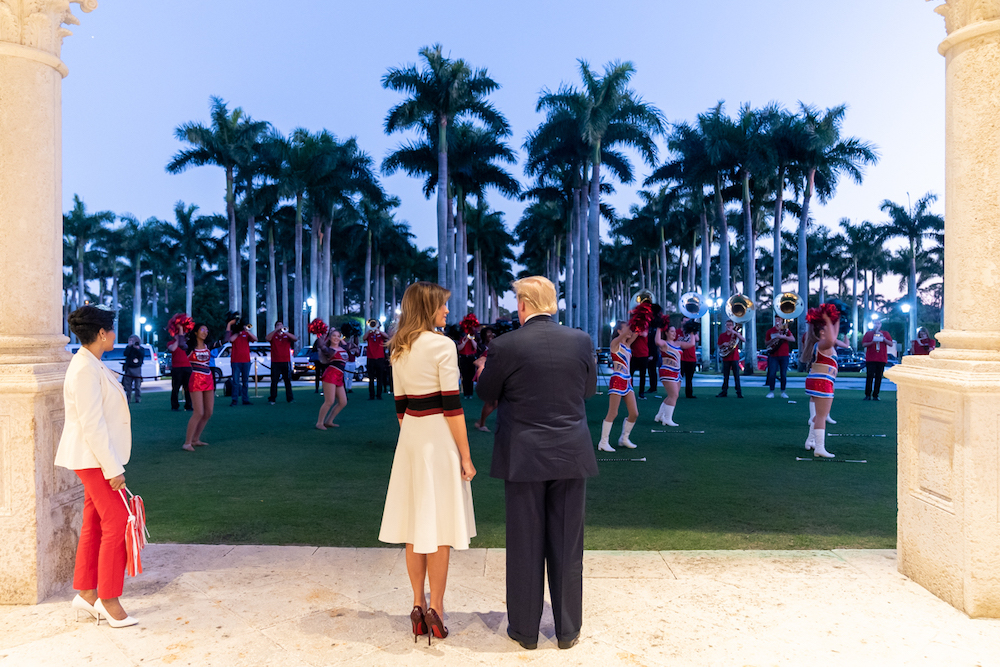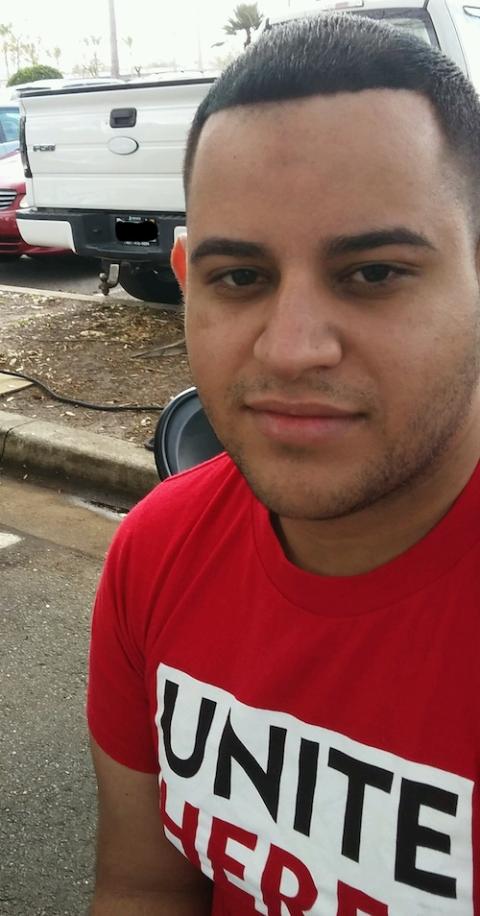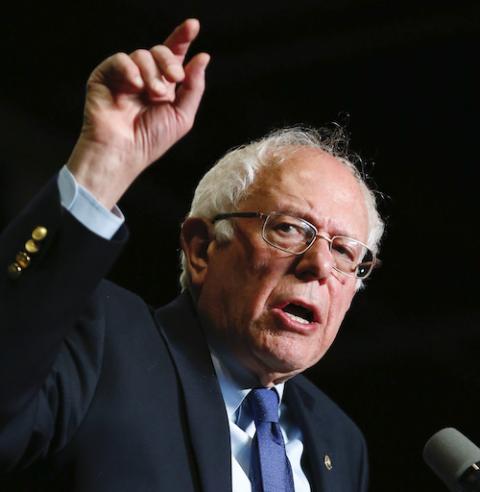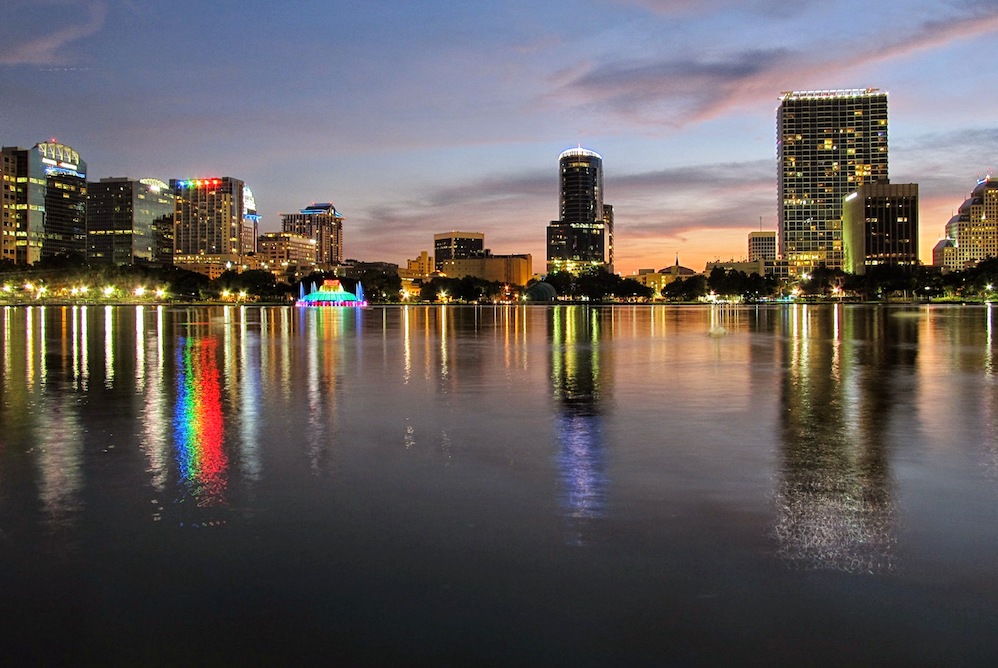
President Donald Trump, right, and First Lady Melania Trump are entertained by members of the Florida Atlantic University marching band Feb. 2, 2020, outside the Trump International Golf Club in West Palm Beach, Florida. (U.S. White House/Shealah Craighead)
Gabriel Ocasio Mejias is a gay man and a Puerto Rican, reasons enough, he says, to vote against President Donald Trump in this year's elections.
But just two weeks before the Florida primary vote March 17, Mejias is focused on another election. He's a union leader for Unite Here. Sipping a morning coffee from a Brazilian food truck beneath the trees outside the office park that houses the organizing effort, Mejias would soon be off to Tampa, with a delegation of airport workers, to the National Labor Relations Board offices to certify their union, anticipating an affiliation vote by summer.
If the married man going home to his wife and kids after a long day at the auto plant was the traditional labor union profile, Mejias is its new look.
Mejias, 28, was fired in February from his barista job at the Starbucks in the airport for, he says, drinking water. He says the real reason was his working to organize his fellow workers, who want a greater slice of the profits from the $5 cappuccinos sold there.

Gabriel Ocasio Mejias (NCR photo/Peter Feuerherd)
Since coming from Puerto Rico two years ago and landing the job at Starbucks, Mejias was earning $10.25 an hour, with what he described as a substandard and expensive health care plan, with little opportunity to make more money as store managers cut down on overtime.
Still, he misses the job and his fellow workers.
"We are a close family at Starbucks, and we care about each other a lot," he told NCR. Mejias moved from Puerto Rico with his family after Hurricane Maria, joining an estimated 50,000 fellow Puerto Ricans in central Florida, frequently referred to as the I-4 corridor, a 133-mile stretch runing from Tampa in the west to Daytona Beach in the east. It is considered a potential hotbed of anti-Trump sentiment, as many Puerto Ricans see themselves as orphans of a frequently castigated hurricane recovery effort.
Mejias described himself as previously apolitical. But as a gay man, a Puerto Rican and a union leader — his union is neutral in the upcoming primary but will work against Trump as his corporate-friendly policies and appointments to the National Labor Relations Board work to stymie union organizing — Mejias is prepared to vote in this pivotal state. His wrath is directed at Trump.
"He is a threat to me overall. I am all those in one person. All of it is a threat to me personally," he said.
Florida political mix
The influx of Puerto Ricans like Mejias is part of the complicated mix of Florida politics, noted Frank Orlando, director of the Polling Institute at St. Leo's University near Tampa. Orlando, with an appropriate surname to comment on Central Florida politics, said that Puerto Ricans, unlike other immigrant Latinos, are entitled to vote as soon as they establish residency, the result of the island's status as a U.S. territory.
Puerto Ricans, particularly those who are Catholic, are likely to be Democrats, and their movement to Central Florida has swayed the city of Orlando and its suburbs toward a blue coloring. The fact that Puerto Ricans are immediately eligible to vote, said Frank Orlando, changes the political equation. It is different than in the Tampa area, where there are more transplanted Republicans from the Midwest and Northeast, as well as Venezuelans and Colombians, who are usually non-citizens and as such cannot vote.
But Orlando cautioned against describing Puerto Ricans as a political monolith. Many Puerto Rican Pentecostals and evangelicals, he said, are more inclined to vote Republican, and the mix of politics from the island doesn't always translate easily into Republican/Democrat terms on the mainland.
The new Puerto Ricans in Florida may well flow seamlessly into what is a complicated political state. Florida, infamous for the 2000 vote debacle, went for Trump in the last election, after going for Barack Obama twice.

Composite view of Unite Here solidarity poster (NCR photos/Peter Feuerherd)
In the complicated mix of political Florida, south is north, north is south and much of the battle is fought over the newly-emerging communities in the middle rising from the swamps of central Florida.
The Miami area of South Florida reflects a more Democratic tilt, with its mix of transplanted New Yorkers and Latinos. Cubans, with a long anti-Castro, anti-communist animus, have historically allied with Republicans, but younger Cubans, a generation removed from the revolution, are more likely to vote Democrat.
Northern Florida, particularly the panhandle region and the suburbs around Jacksonville, track more conservative, reflecting the social and economic values of neighboring rural Alabama and Georgia.
In the upcoming primary, said Orlando, Florida's Democrats are not likely to offer a large majority for Sen. Bernie Sanders, particularly after the senator's remarks praising Fidel Castro's literacy program, which did not sit well with many Cuban Americans. Polling done before Super Tuesday indicated strength for former Vice President Joe Biden, who is expected to win the primary here March 17.
Republican growth
The growing Puerto Rican vote in central Florida is offset by Republican growth in other areas. While Democrat-leaning Latinos continue to grow in the state, so are transplanted Midwestern and Northeastern Republicans, generally older voters who don't like high taxes. Senior complexes such as The Villages continue to expand. While Florida remains a swing state, said Orlando, it may well, in the aftermath of Trump's 2016 victory and that of Republican Gov. Ron DeSantis two years later, lean more red.
But the immediate city of Orlando and its inner suburbs is turning more blue, with election victories of Democrat congressman and local city officials in the last election.

Sen. Bernie Sanders during a campaign rally in Phoenix in 2016. (CNS/Nancy Wiechec)
For the Rev. Jose Rodriguez, an Episcopal priest and central Florida social activist, the change in the city of Orlando is no better symbolized than in the changes taking place at his alma mater, the Stonewall Jackson Middle School.
When he attended Stonewall Jackson in the 1990s, he was one of a handful of Puerto Rican students, often a subject of racial hostility. He was once hit on the head by a fellow student with a trumpet case adorned with a Confederate flag. Now the school is changing its name from a memorial to a Confederate general to a Latino hero, yet to be named.
"That sums up the changes that have occurred," said Rodriguez. "That [school name] was unjust for our African American brothers and sisters. We don't want our children to grow up with that." He said it is the only case in the country of a Latino community successfully changing the name of a former Confederate memorial.
Puerto Ricans have long been in Orlando, he said. But previously they blended in with the local Cuban community. They are now numerous enough to stand out and assert political power.
Puerto Rico, he said, has been pillaged both by natural storms and rapacious corporations. Orlando, with its abundance of jobs in the tourism industry, is seen as a beacon of opportunity for the island's diaspora. But they remember what the Trump administration did not accomplish after the hurricane.
"There's a lot of anger about the abandonment of the island," he said. Most Puerto Ricans are convinced that FEMA aid was slow in coming and did not benefit from the kind of effort that would have occurred if a U.S. state suffered a similar calamity.
That anger is being transformed into political power, said Rodriguez, noting the growth in the number of Latino representations on the local county commission and boards of education, as well as the election of Democrats to Congress. Give it a few years, he said, and the Puerto Rican political power in Orlando will rival the power exerted by the Cubans in Miami.
A transplanted Trump supporter
While Rodriguez and Democrats work to transform the Puerto Rican newcomers into a political force, Trump and the Republicans are looking to solidify their base in Florida with another kind of émigré.
Just 25 miles from the nation's oldest European settlement in St. Augustine is the city of Palm Coast, a sign of the new Florida. A former swamp, it has been one of the fastest growing cities in the U.S., nearly tripling its size over two decades, now boasting close to 90,000 people. The residents largely live in single-family houses, amidst the franchise stores and restaurants that dot the landscape off I-95. While it includes a sizeable number of immigrants — including one strip mall with nearly adjacent Puerto Rican and Cuban restaurants — its politics are Republican, and was recently represented in Congress by DeSantis, the pro-Trump Republican governor who won statewide office in 2018 in what was otherwise nationally known as a Democratic wave.
John Efstathiou is one of those Palm Coast migrants, having moved from Queens, New York, 10 years ago after retiring from the post office. He is the John of John's Luxury Car Service, which, with the help of a handful of drivers who work for him, regularly shuttle passengers to Orlando Airport, a 90-minute drive across I-4's eastern corridor.

Lake Eola Park in Downtown Orlando, Florida, June 2016 (Wikimedia Commons/Miosotis Jade)
He doesn't see himself as Democrat or Republican but as pro-Trump, he declares in the nearly 100-mile ride to the airport. He offers customers a choice of music, including early hip hop (he doesn't like the new stuff) from the streets of Jamaica, Queens, where he grew up and where he got to know the hip hop pioneers. Efstathiou, the son of Greek immigrants, is married to a Polish immigrant, and he likes Trump's policies focusing on immigration law enforcement. He is willing to allow long-term immigrants to stay, but he is concerned about border enforcement. He is among those rare Obama-voters-to-Trump-voters — he went Democratic in 2008, but has gone Republican since in presidential elections — which some political scientists see as key to the 2020 election. Others see them as numerically insignificant, rare unicorns.
While Efstathiou is a former union member who used to regularly vote Democratic, he is not budging this time around. Trump, he said, "is an American. He's not for one world government. He lowered my taxes."
Efstathiou, who holds a master's degree in history from Queens College in New York, is quick to cite the Democratic heroes of yesteryear, such as Franklin Delano Roosevelt and John F. Kennedy, whom he admires. He knows the history of how Roosevelt, in particular, rescued capitalism from its excesses. "But not the modern Democrats of today. The last 10 to 15 years, they strayed. They went to identity politics," he said, the echoes of the streets of Queens resonating in his voice.
Political correctness he decried as "a form of suppression of political free speech." And, while his voting pattern has moved toward the Republicans in recent years, he emphasized that "Trump is not a Republican. Trump is Trump. He's something different."
He likes the Trump administration's policies of withdrawal from foreign conflicts and suspicion of international organizations. He is still angry over Hillary Clinton's role as U.S. Secretary of State in the toppling of Muammar Gaddafi of Libya, a move he said was an example of America meddling overseas.
Efstathiou can quote Karl Marx and refers to the Hegelian dialectic, at the same time reminding a visiting New Yorker what his zip code is, a remnant of years with the post office in Queens. He is suspicious of Trump's critics, including those who have taken him to task for the response to the coronavirus.
"It's not about the virus. It's about creating panic. The ruling class never lets a good crisis go to waste," he said. The mainstream media, he said, are not to be trusted with telling the full truth.
Advertisement

Pope Francis greets U.S. Vice President Joe Biden after both spoke at a conference on adult stem cell research at the Vatican April 29, 2016. (CNS/L'Osservatore Romano handout)
A Catholic role
In the midst of this Florida political swirl of contrasts are Catholics, the state's largest religious group. Their role remains a hodgepodge. The church retains a strong influence, particularly among Latino and northern transplants.
Efstathiou, while Greek Orthodox, will attend the occasional Catholic Mass with his Polish wife. Mejias, a Catholic, admires Pope Francis, with his outreach to the LGBT community and his focus on the poor. When he hears what the pope has to say, he feels a sense of pride in being Catholic.
Xiomara Sifuentes, another Unite Here member, came from Puerto Rico and works in food preparation at the airport. She's fighting for a Florida $15 minimum wage, a status she has yet to achieve after two years of work.
She's found that her Pentecostal church is supportive of workers like herself who need assistance to get through the month. She likes Sanders, and thinks he could make a change in her situation. She remains untouched by Trump campaign efforts, such as a recent Miami rally featuring the president, that target evangelical Latino communities.
Orlando, the polling institute director at St. Leo's University, notes that Catholics in Florida, like much of the rest of the country, will view this election through their own prism. The cafeteria line on Catholic social teaching is wide open.
"Many white Catholic voters put their political party affiliation ahead of their Catholic affiliation," he said, noting that many transplants from other regions will vote Republican, embracing the church's views on abortion while downplaying issues such as immigration and economic justice emphasized by Francis. Younger Catholics and immigrant communities are more likely to lean Democrat, he said.
"Catholic voters take the stuff they like from Catholic teaching," said Orlando. "It's certainly not a unified vote."
Sifuentes' friend and fellow union member, Leslie Rodriguez, is the beneficiary of the union representing workers at Walt Disney World, where she works in housekeeping after landing a job at the theme park five years after coming to Florida from Puerto Rico. Rodriguez said that union membership has enhanced dignity and increased wages for covered workers at Orlando's major tourist attraction. Housekeepers like her now make at least $15 per hour. The coming election could enhance the union's efforts, she said.
"For me a new president needs to be a Democrat," she said. "We need to move Florida blue." A worshiper at Orlando's Holy Cross Cathedral Parish, Rodriguez said that her social activism will be topped off by her vote this November.
"We need to vote. We need to vote for change," she said.
[Peter Feuerherd is NCR news editor. His email address is pfeuerherd@ncronline.org.]






